Pimpri Chinchwad
PCMC | |
|---|---|
  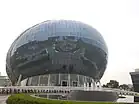  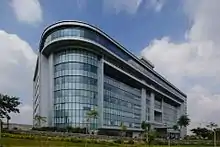 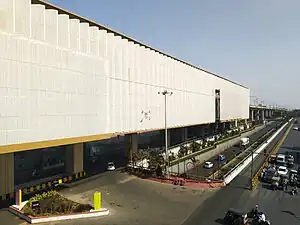 Clockwise from top: PCMC Building, Infosys, Old Pune–Mumbai Highway, PCMC Bhavan metro station, JRD TATA Bridge, Embassy Tech Zone | |
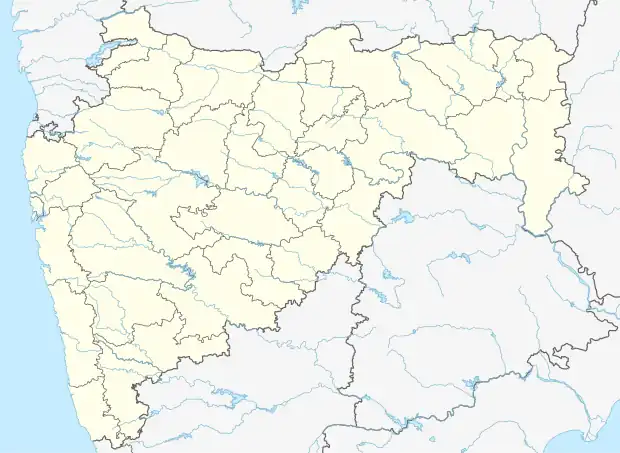 Pimpri Chinchwad  Pimpri Chinchwad 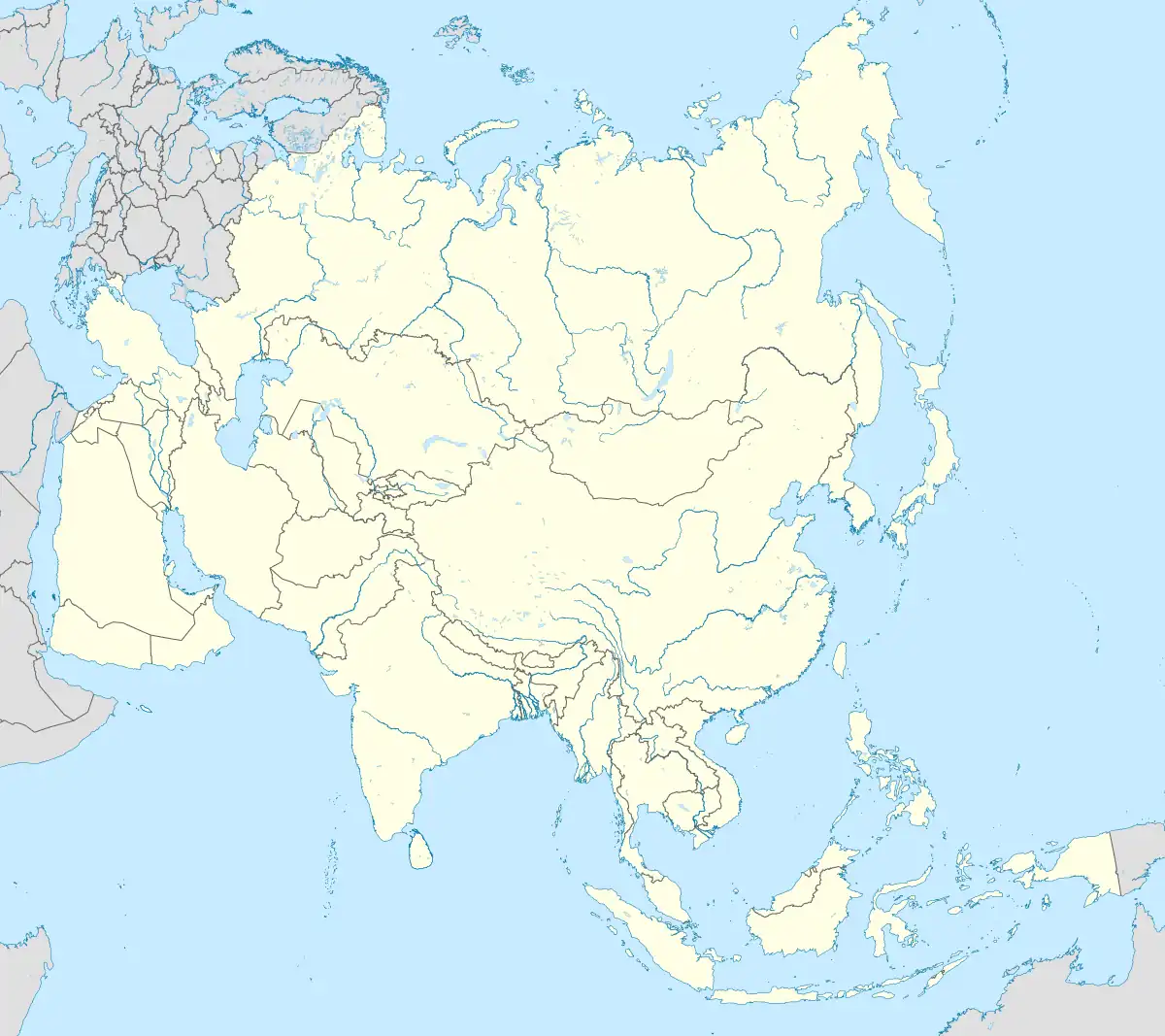 Pimpri Chinchwad | |
| Coordinates: 18°37′07.04″N 73°48′13.43″E / 18.6186222°N 73.8037306°E | |
| Country | |
| State | Maharashtra |
| District | Pune district |
| Division | Pune division |
| Established | 11 October 1982[1] |
| Government | |
| • Type | Municipal Corporation |
| • Body | PCMC |
| • District Collector | Rajesh Deshmukh |
| • Municipal Commissioner & Administrator | Rajesh Patil, IAS[2] |
| • Mayor | Vacant |
| Area | |
| • Total | 181 km2 (70 sq mi) |
| Elevation | 530 m (1,740 ft) |
| Population | |
| • Total | 1,727,692 |
| • Rank | 18th |
| • Density | 9,500/km2 (25,000/sq mi) |
| Languages | |
| • Official | Marathi |
| Time zone | UTC+5:30 (IST) |
| PIN | 411017[4] |
| Area code | +91-20 |
| Vehicle registration | MH14, MH12 |
| Lok Sabha constituency | Maval, Shirur |
| Vidhan Sabha constituency | Chinchwad, Pimpri, Bhosari |
| Urban Planning Authority | Pune Metropolitan Region Development Authority |
| Website | http://www.pcmcindia.gov.in |
Pimpri-Chinchwad also known as "PCMC", is a city in the Indian state of Maharashtra. The city is about 15 km (9.3 mi) northwest of the historic city of Pune, at an altitude of 590 m (1,940 ft) above sea level.[5][6][7] It is the fifth largest city in Maharashtra and the nineteenth largest city in India and the sixteenth largest satellite city in the world by population. The city is located 135 km (84 mi) southeast from the state's capital Mumbai. It is one of the most rapidly developing suburban areas in India and has emerged as the third fastest growing city in the country.[8] It is well known for its automotive, IT and manufacturing industry.[9][10]
History
The first reference to Pune region is found in two copper plates dated to 758 and 768 AD, issued by Rashtrakuta ruler Krishna I. The plates are called "Puny Vishaya" and "Punaka Vishaya" respectively. The plates mention areas around Pune such as Theur, Uruli, Khed, Dapodi, and also Bhosari, now part of the city.[11]
Chinchwad is noted for the shrine of Morya Gosavi, a prominent saint of the Ganapatya denomination of Hinduism that worships Lord Ganesha as the Supreme Being or its metaphysical concept of Brahman. Various sources place Moraya Gosavi between the 13th and 17th centuries CE.[12][13][14] The inscription on the temple records that its construction began in 1658 CE.[15]
British Raj and Partition of India
Chapekar brothers

Chinchwad is the birthplace of the Chapekar brothers: Damodar Hari (1870–1898), Balkrishna Hari (1873–1899) and Vasudeo Hari, who assassinated W. C. Rand, a British civil service officer and the chairman of the Special Plague Committee of Poona (Pune), on 22 June 1897.[16][17]
Pimpri Camp
Following the partition of India, the Government of India constructed 1,609 residences and laid out around 300 plots on 203 acres of land in the Pimpri area.[18] This area came to be known as Pimpri Camp is one of the 31 refugee camps in Bombay State (present day Maharashtra) set up during the period.[19][20]
Pimpri-Chinchwad after independence
After Indian independence from the British in 1947. In 1955, Hindustan Antibiotics was set up in Pimpri with the cooperation of WHO and UNICEF with the social objective of providing affordable drugs throughout India. It was inaugurated by India's first Prime Minister Jawaharlal Nehru on 10 March 1954. Production began in 1955. The establishment of Hindustan Antibiotics in 1954 marked the beginning of industrial development in the Chinchwad, Bhosari, and Pimpri areas.[21][22] MIDC provided the necessary infrastructure for new businesses to set up operations.[23]
Geography
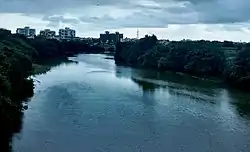
The area within the city limits is widely considered as 'flat' given the altitude varying between 530 and 570 m above sea level. The city is situated approximately at 18° 37' north latitude and 73° 48' east longitude bordering limits of Pune Municipal Corporation on the north and northwest. The historic centre is 15 km from each end.[24] Three rivers Pavana, Mula and Indrayani flow through this area. The rivers originates from the Western Ghats. The base rock found throughout the city is Deccan trap basalt. Building stone is the only commercially important mineral found in the area.[24][25] In 1970s, due to increased industrialisation on Mumbai–Pune Highway, many villages around the highway were merged to form Pimpri-Chinchwad Municipal Corporation. The earliest villages which were absorbed were Pimpri, Chinchwad, Dapodi, Bhosari etc.
Climate
The city experiences three seasons: summer, monsoon and winter. Typical summer months are February to May with maximum temperatures above 35 °C and reaching up to 42 °C on hotter days. The city receives most of its 722 mm of rainfall in the monsoon months of June to September. The temperature in the winter months of October to January ranges from 12 °C (min) to 30 °C (max), with night temperatures often falling below 10 °C.[24][25]
Pimpri-Chinchwad has a tropical wet and dry (type Aw) climate, with the characteristics of a hot semi-arid climate (type BSh) climate with average temperatures ranging between 20 and 28 °C (68 and 82 °F).[26] Typical summer months are from mid-March to mid-June, with maximum temperatures sometimes reaching 42 °C (108 °F). The warmest month in Pimpri-Chinchwad is May. The city often has heavy dusty winds in May, with humidity remaining high. Even during the hottest months, the nights are usually cool due to Pune's high altitude. The highest temperature recorded was 43.3 °C (109.9 °F) on 30 April 1897.[27]
The monsoon lasts from June to October, with moderate rainfall and temperatures ranging from 22 to 28 °C (72 to 82 °F). Most of the 722 mm (28.43 in) of annual rainfall in the city falls between June and September, and July is the wettest month of the year. Hailstorms are not unheard of.
For most of December and January the daytime temperature hovers around 26 °C (79 °F) while night temperatures are below 9 °C (48 °F), often dropping to 5 to 6 °C (41 to 43 °F). The lowest temperature recorded was 1.7 °C (35 °F) on 17 January 1935.
| Climate data for Pimpri-Chinchwad (1981–2010, extremes 1901–2012) | |||||||||||||
|---|---|---|---|---|---|---|---|---|---|---|---|---|---|
| Month | Jan | Feb | Mar | Apr | May | Jun | Jul | Aug | Sep | Oct | Nov | Dec | Year |
| Record high °C (°F) | 35.3 (95.5) |
38.9 (102.0) |
42.8 (109.0) |
43.3 (109.9) |
43.3 (109.9) |
41.7 (107.1) |
36.0 (96.8) |
35.0 (95.0) |
36.1 (97.0) |
37.8 (100.0) |
36.1 (97.0) |
35.0 (95.0) |
43.3 (109.9) |
| Mean daily maximum °C (°F) | 29.8 (85.6) |
32.1 (89.8) |
35.6 (96.1) |
37.6 (99.7) |
36.9 (98.4) |
31.9 (89.4) |
28.3 (82.9) |
27.6 (81.7) |
29.4 (84.9) |
31.5 (88.7) |
30.4 (86.7) |
29.2 (84.6) |
31.7 (89.1) |
| Mean daily minimum °C (°F) | 11.2 (52.2) |
12.2 (54.0) |
15.7 (60.3) |
19.6 (67.3) |
22.6 (72.7) |
23.1 (73.6) |
22.4 (72.3) |
21.7 (71.1) |
20.9 (69.6) |
18.4 (65.1) |
14.5 (58.1) |
11.5 (52.7) |
17.8 (64.0) |
| Record low °C (°F) | 1.7 (35.1) |
3.9 (39.0) |
7.2 (45.0) |
10.6 (51.1) |
13.8 (56.8) |
17.0 (62.6) |
18.9 (66.0) |
17.2 (63.0) |
13.2 (55.8) |
9.4 (48.9) |
4.6 (40.3) |
3.3 (37.9) |
1.7 (35.1) |
| Average rainfall mm (inches) | 1.1 (0.04) |
0.3 (0.01) |
2.2 (0.09) |
8.5 (0.33) |
26.8 (1.06) |
173.4 (6.83) |
181.4 (7.14) |
145.2 (5.72) |
146.1 (5.75) |
86.3 (3.40) |
25.0 (0.98) |
7.0 (0.28) |
803.0 (31.61) |
| Average rainy days | 0.2 | 0.1 | 0.2 | 0.8 | 1.9 | 9.5 | 12.4 | 9.8 | 8.0 | 4.4 | 1.2 | 0.3 | 48.7 |
| Average relative humidity (%) (at 17:30 IST) | 34 | 26 | 21 | 24 | 37 | 66 | 76 | 79 | 73 | 53 | 43 | 39 | 47 |
| Mean monthly sunshine hours | 294.5 | 282.5 | 300.7 | 303.0 | 313.1 | 183.0 | 114.7 | 111.6 | 177.0 | 244.9 | 264.0 | 279.0 | 2,868 |
| Mean daily sunshine hours | 9.5 | 10.0 | 9.7 | 10.1 | 10.1 | 6.1 | 3.7 | 3.6 | 5.9 | 7.9 | 8.8 | 9.0 | 7.9 |
| Source: India Meteorological Department[28][29][30] | |||||||||||||
Cityscape
- Selection of neighborhoods in Pimpri-Chinchwad
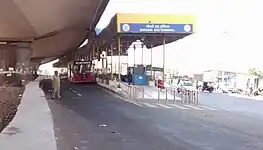
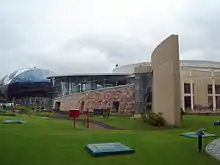

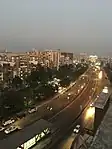
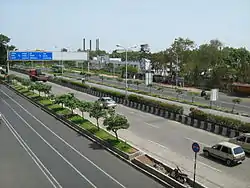
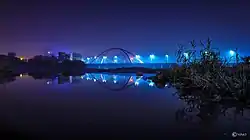
Demographics
| Year | Pop. | ±% |
|---|---|---|
| 1951 | 9,522 | — |
| 1961 | 27,975 | +193.8% |
| 1971 | 83,542 | +198.6% |
| 1981 | 232,935 | +178.8% |
| 1991 | 534,536 | +129.5% |
| 2001 | 1,020,448 | +90.9% |
| 2011 | 1,727,692 | +69.3% |
| 2017 (est) | 2,100,000 | +21.5% |
| Population figures for Pimpri-Chinchwad Municipal Corporation area Source: 1951-2011,[3] 2017 (est).[31] | ||
As of the 2011 Census of India, the Pimpri Chinchwad Municipal Corporation area had a population of 1,729,692.[3] The sex ratio was 833 females per 1000 males.[3] About 13% of the population was under seven years of age with a sex ratio of 875 females per 1000 males.[3] Around 8% of the city's population lives in slums.[3] Pimpri-Chinchwad has an average literacy rate of 89.22% (92.41% males; 85.37% females),[3] higher than the national average of 74.04%. The main language spoken in the city is Marathi.[1] There is a significant Sindhi population in Pimpri, which dates to the partition of India in 1947. The neighbourhood has considerable Hindi, Malayalam, Punjabi, Gujarati, Tamil, Kannada, Telugu speaking population.[32][33]
Religion
Hinduism is the dominant religion in the city. Other religions with a significant presence include Islam, Christianity, Sikhism, Buddhism and Jainism.[34]
.JPG.webp)
The samadhi (resting) places of the two most revered Marathi Bhakti saints, Dnyaneshwar and Tukaram, are at Alandi and Dehu respectively.[35] The Khandoba Mandir in Akurdi is one the family deity for most Marathi Hindus. The Peshwa era rulers provided endowments to more Maruti temples than to temples of other deities such as Shiva, Ganesh or Vitthal. Even in the present time, there are more Maruti temples than those of other deities.[36][37]
- Alandi - The town attracts millions of devotees annually to the resting place or (Samadhi) of the 13th century Marathi Bhakti saint, Sant Dnyaneshwar.[38]
- Dehu - The town on the banks of the indrayani river is associated with Tukaram,[39] the 17th-century poet-saint of the Bhakti movement in Maharashtra.[40] The town is visited by hundreds of thousands of people for the annual Pandharpur Wari when the paduka (symbolic sandals) of the saint are carried to Pandharpur in a palkhi.
Economy
Pune is one of the major industrial hubs in Asia in which the majority contributes from the neighbourhood of Pimpri-Chinchwad.[41] The formation of MIDC in 1962 resulted in a constant process of industrial land acquisition and the creation of required support infrastructure. Since then, there has been a massive influx of several European companies who continue to be keen on setting up manufacturing facilities in PCMC, Pune. It has a rapid growth in terms of the industries and most of the major automobile companies and their headquarters are located here. There is also a rapid growth in the software and IT departments.
Industrialization started in 1954 with the arrival of antibiotics research institute Hindustan Antibiotics Limited (HAL).[42] PCMC, Pune is now home to the Indian operations of major automobile companies like Bajaj Auto, BEL Optronic Devices Limited, Daimler Chrysler, Force Motors, General Motors, Jaguar Land Rover, Kawasaki, Kinetic Engineering, Mahindra & Mahindra, Mercedes-Benz India, Premier Ltd., TATA Motors, Thermax and Volkswagen.[42]
In addition to this, several heavy industries such as Alfa Laval, Atlas Copco, ATS Automation Tooling Systems, Bharat Forge, Bosch, Bridgestone, Finolex Group, Forbes Marshall, Geberit, General Electric, Hyundai Heavy Industries, IKEA, KSB Pumps, Lear Corporation, Lumax, Manitowoc Cranes, New Holland Agriculture, Sandvik, Sany, Schindler Group, Sigma Corporation, SKF, Suzlon, ThyssenKrupp, Varroc have their manufacturing units in the city.
The Rajiv Gandhi Infotech Park in Hinjawadi is a ₹60,000 crore (US$8.9 billion) project by the Maharashtra Industrial Development Corporation (MIDC).[43][44] The IT Park encompasses an area of about 2,800 acres (11 km2) and is home to over 800 IT companies of all sizes.[45]
Government and public services
On 4 March 1970, the villages of Pimpri, Chinchwad, Bhosari and Akurdi merged into a single municipal authority, the Pimpri Chinchwad Municipal Council, Pune.[46][47] Two years later, the Pimpri Chinchwad New Town Development Authority, Pune was established. Its chief objective was to create a planned environment for the working population in the vicinity of their work place.[46][47] On 11 October 1982, the Municipal Council was merged with seven surrounding villages and the PCNTDA area to form the a new Municipal Corporation (Pimpri Chinchwad Municipal Corporation, Pune, and it split apart from the Haveli taluka to become the 15th and newest of Pune district's talukas.[5][46][47] The size of the city more than doubled in 1997 (from 84.51 km2 to 170.51 km2.) with the addition (in part or in full) of 18 villages located at the periphery of the PCMC as it existed in 1982. Tathawade was added to the city in 2008, bringing the total area of the neighbourhood to 176.41 km2.[46][47]
Civic Administration
The Pimpri Chinchwad Municipal Corporation, Pune is the local governing body. It comprises two branches: the executive branch headed by the Municipal Commissioner, an IAS officer appointed by the Government of Maharashtra, and an elected deliberative branch, the general body, headed by the Mayor. Municipal elections are held every five years to elect councilors, popularly known as 'corporators', who form the general body of the PCMC. The corporators, in turn, elect the mayor and the deputy mayor. In the Municipal Elections held in February 2017, 128 corporators were elected to represent the 32 electoral wards (4 corporators per ward).[48] While the position of the mayor is mostly ceremonial, the chief executive of the city is the Municipal Commissioner, appointed by the state government.[49] The JNNURM award for Best Performing neighbourhood, under Sub-Mission for Urban Infrastructure and Governance, was given to PCMC, Pune. The "System of Assisting Residents and Tourist Through Helpline Information" (SARATHI), the grievance portal of the city, has gained national recognition and is a role model for other cities.[50]
Development Agencies
Pune Metropolitan Region Development Authority (PMRDA), which was on the cards since 1997, was formed on 31 March 2015 and is responsible for the integrated development of the PMR.[51][52] Currently its jurisdiction extends over 7,256.46 km2 (2,802 sq mi) and includes the municipal corporations of Pimpri Chinchwad Municipal Corporation, Pune and Pune Municipal Corporation, three cantonment boards, seven municipal councils, 13 census towns and 842 villages.[53]
Law and order
The PCMC Police in Pune is the law enforcement agency for the neighbourhood of PCMC, Pune. It was carved out of Pune City Police Department and took charge on 15 August 2018.[54][55] It is a division of the Maharashtra Police and is headed by the Police Commissioner, an officer of the Indian Police Service.
Civic utilities
The Pavana dam located 35 km from PCMC, Pune is the sole source of water for the city. The water lifted at the Ravet bund is pumped to the Nigdi filtration plant from where it distributed to the entire city.[56][57][58] As of 2018, Pimpri-Chinchwad Municipal Corporation Administration provided around 450 million liters per day (MLD) of water to the city. This led to the generation of around 290 MLD of sewage, of which the civic body had capacity to treat only 240 MLD at its 13 sewage treatment plants, a problem that has persisted for years.[59][60] The untreated water is let into the rivers which lead to several health and environmental problems.[61][62][63] Similar problems in the areas of PMC as well as in the suburban areas, the rivers in the PMR are among the most polluted rivers in the state.[64][65][66][67]
The state owned Maharashtra State Electricity Distribution Company Limited supplies electricity to the city. The power comes from thermal, hydro, gas and renewable sources such as solar, wind and sugarcane bagasse. Bharat Sanchar Nigam Limited (BSNL), owned by the central government, as well as private enterprises such as Vodafone, Bharti Airtel, Reliance, Idea Cellular, Aircel, Tata DoCoMo, Tata Teleservices, Virgin Mobile, and MTS India, are the leading telephone and cell phone service providers in the city.[68]: 25–26 : 179
Transport
Air
The air gateway is the Pune International Airport located at Lohegaon which is about 19 km (12 mi) east of the neighborhood. It is operated by the Airports Authority of India.[69] In addition to domestic flights to all major Indian cities, the airport serves international direct flights to Dubai (operated by Air India Express) and to Frankfurt (operated by Lufthansa).[70][71] As of 2021, it is the 2nd busiest airport in the state and 13th busiest airport in India. The airport is awarded as best airport by hygiene measures in Asia-Pacific in 2020 by Airports Council International.[72]
Due to the limited expansion options available, the airport will not be able to cope with the growing demand for air traffic into Pune. Hence, a greenfield airport for the Pune metropolitan region has been proposed. The Government of Maharashtra has entrusted the responsibility to Maharashtra Airport Development Company (MADC) for executing the Pune International Airport project.[73] Probable sites for this project had earlier included areas around Talegaon Dabhade and Saswad near Pune. An area between Chakan and Rajgurunagar, around the villages of Chandus and Shiroli was under consideration. However, due to land acquisition issues, a new site has been proposed. The greenfield airport will be located near the villages of Ambodi, Sonori, Kumbharvalan, Ekhatpur-Munjawadi, Khanwadi, Pargaon Memane, Rajewadi, Aamble, Tekwadi, Vanpuri, Udachiwadi, Singapur near Saswad and Jejuri in Purandar taluka of Pune District in the Indian state of Maharashtra.[74] The proposed airport in Purandar will be spread over 2,400 hectares. This airport will also boost trade from Pune and neighbouring districts as it will have its own dedicated cargo terminal.
Public transport
Public transport modes in PCMC limits include Suburban Railway, bus and Rainbow BRTS services operated by PMPML and auto rickshaws. Pune Metro, an urban mass rapid transit system is under construction in the twin cities.[75] Uber and Ola Cabs also provide vehicle for hire services in the city.
Road


It is well connected to neighbouring cities via several highways. It has a 633-km long extensive network of roads connecting its various neighbourhoods. The NH 48 runs throughout the city and serves as the main connecting link for the PCMC and PMC. After the Mumbai–Pune Expressway was opened in 2002, this road came to be known as Old Mumbai–Pune Road. It starts in the suburb of Shivajinagar (earlier Bhamburde) and passes through the suburbs of Khadki cantonment, Bopodi, Dapodi, Kasarwadi, Pimpri, Chinchwad, Nigdi, Dehu Road cantonment, Kivale, Mamurdi, Gahunje, Talegaon Dabhade, and Vadgaon Maval all the way up to Mumbai.The NH 60 originates at Nashik Phata at Kasarwadi is another important road passes through the suburbs of Kasarwadi, Bhosari, Chikhli, Moshi, Chimbali, and Chakan all the way up to Nashik. The Giant Metrewave Radio Telescope in Khodad is off this road. The Pimpri-Chinchwad link road connects the suburbs of Pimpri and Chinchwad, as one of the alternative roads to Mumbai–Pune Road. The Mumbai Pune Expressway that originates at Kiwale just outside the city, is India's first 6-lane wide concrete, access-controlled tolled expressway.[76] It spans a distance of 94.5 km connecting Mumbai, the capital of Maharashtra state and the financial capital of India, with Pune, the cultural and educational capital of Maharashtra.[77] The expressway, which was fully operationalized in 2002, introduced new levels of speed and safety in automobile transportation to Indian roads.[78] It is one of India's busiest roads.[79]
A ring road is being planned for the convenience of heavy traffic.[80][81][82]
Bus service
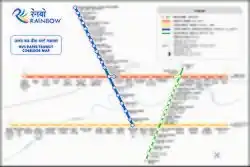

Until 2007, PCMC, Pune served by its own public transport bus service provider, the Pimpri Chinchwad Municipal Transport, Pune. On 19 October 2007, it was merged with the Pune Municipal Transport, Pune that served it's historic neighbourhood of Pune to form the Pune Mahanagar Parivahan Mahamandal Limited (PMPML; lit. Pune Metropolitan Transport Corporation Ltd.).[83][84] PMPML runs buses on 371 routes that cover a radius of 20 km around the city of Pune, India.[85][86] It also runs services on BRT corridors under the brand name Rainbow BRTS. As of May 2018, there are two operating BRT corridors in PCMC limits with a combined length of 22.5 km, while work is underway on three other corridors with a total length 28 km.[87] Although the BRTS project has been deemed a failure in the historic PMC, PCMC claims that the two BRT corridors, Sangvi-Kiwale and Nashik Phata-Wakad, have seen a rise in ridership after they became operation in 2015.[87][88][89] The Maharashtra State Road Transport Corporation operates buses from its main station at Vallabh Nagar, Pimpri to all major cities and towns in Maharashtra as well as in the neighbouring states. Private companies also run bus services throughout India.[90]
Rail
Pimpri Chinchwad is served by five railway stations, Chinchwad, Akurdi, Pimpri, Kasarwadi and Dapodi, on the Pune Suburban Railway as well as the Mumbai Dadar–Solapur sections of the Indian Railways (Central zone). Local trains (EMUs) connect PCMC, Pune to its historic neighbourhood of Pune and the hill station of Lonavala, while daily express trains connect it to Mumbai. Daily express trains through Pune Junction connect the city to other parts of the country. Pune Suburban Railway, connecting PCMC, Pune to its historic core and its suburbs in Pune District, Maharashtra. It is operated by Central Railway (CR). The system operates on two routes, Pune Junction–Lonavala and its part Pune Junction–Talegaon. 18 trains operate on Pune Junction–Lonavala route and 5 trains operate on Pune Junction–Talegaon route.[91]
Metro
Pune Metro, a mass rapid transit system, was inaugurated in March 2022.[92][93] The system comprises 3 lines with a total length of 54.58 km. As of 2022, Pimpri-Chinchwad has been served by 6 metro stations of Purple Line which is PCMC Bhavan, Sant Tukaram Nagar, Nashik Phata, Kasarwadi, Phugewadi, Dapodi. The 16.59 km Line 1 PCMC Bhavan – Swargate will be elevated between PCMC Bhavan to Range Hills, from where it will run underground. Line 2 will run from Vanaz to Ramwadi covering a distance of 14.66 km on an elevated viaduct.[94] Lines 1 and 2 are expected to be operational in 2021.[95] The 23.33-km elevated Line 3 will run from the Rajiv Gandhi Infotech Park in Hinjawadi via Balewadi to Civil Court. All three lines will align at the Civil Court interchange station.[96] The detailed project report (DPR) was prepared for the initial two lines by Delhi Metro Rail Corporation which was approved by the State government in 2012 and by the Central government in December 2016.[97][98][99] Out of the two lines, Line 1 will run through PCMC limits from PCMC Bhavan to Dapodi and further to Swargate in Pune, India.[100] A detailed project report is being prepared for the extension of the line up to Nigdi.[101][102] The project is being implemented by MahaMetro, a 50:50 joint venture of the State and Central governments.[103] Line 3 from Hinjawadi to Civil Court, Shivajinagar was approved by the State and Central governments in January and March 2018, respectively.[104][105] The 23.3-km line is being implemented by PMRDA on a public-private partnership basis and will have a station at Wakad in PCMC limits.[106] Another metro route connecting Hinjawadi to Moshi via Nashik Phata, Bhosari is also being contemplated.[101][107]
Personal transport
Rapid urbanization has led to the population of the city to double from 2001 to 2017.[108][31] In the same period, the number of vehicles has increased of 700%.[108][109] Like its neighbouring Pune, motorized two-wheelers dominate the streets. At the rate of 663 vehicles per 1000 residents, a total of 1.57 million vehicles are registered in the city in 2018, of which 1.17 million are two-wheelers.[31][109] Public transportation in the city has not been able to keep up with the demand and is infamous for its unreliability leading to a constant upward trend in the number of vehicles.[110][111] Unsurprisingly, the whopping number of vehicles has led to several problems including air pollution, noise pollution and traffic congestion.[112][113][114][115][116]
Culture
Festivals and events
Like most Indian cities, a number of festival are celebrated across all communities in the city including Ganeshotsav,[117] Navaratri, Dussehra, Janmashtami, Dahi Handi and Onam[118] Holi, Diwali, Eid al-fitr, Eid al-Adha, Christmas, Buddha Purnima, Cheti Chand,[119] Chalio,[120] and several others.[121] The birth anniversary celebrations of historical figures like Chhatrapati Shivaji,[122] the founder of the Maratha Empire, and Dr. Babasaheb Ambedkar,[123] the principal architect of Indian Constitution, among others are also celebrated with great pomp and show. The national holidays of Republic Day and Independence Day are also celebrated.[121] Individual towns also organize annual village fairs which are dedicated to the local deity. The Bhairavnath fair in Bhosari is perhaps the well-known village fair for its controversial bullock cart race.[124][125]

The PCMC festival is an annual cultural event held in the city. It was started by the Pimpri Chinchwad Municipal Corporation, Pune in 1996 under the name 'Ganesh Festival' as it used to be organized on the occasion of Ganeshotsav. Since 2004, the PCMC stopped organizing the festival and it was kept alive by the PCMC Social Club. Since 2014, the festival is not organized during Ganeshotsav but at another time of the year.[126][127] Pavanāthaḍi Jatrā (Marathi: पवनाथडी जत्रा) is an annual event organized by the Women and Child Welfare Committee of the PCMC. It is a three to five day long exhibition cum sale of goods produced by women's self-help groups in the city and features over 300 stalls.[128][129][130] The city also participates in the Pune International Film Festival with screening of several films at a cinema in the city limits.[131][132]
Tourism
Parks
Durga Tekdi and Bhakti-Shakti are one of main public parks in Pune. The Bhakti Shakti garden hosted the second largest national flag of India at 351 ft. The Boat Club Garden, Thergaon on the bank of Pawana River hosts kids play area, toy train ride, 15 meter high watch tower, boating and rafting.[133] The city also has a zoo named after Nisargakavi Bahinabai Chaudhari in Chinchwad East.[134][135] A lake garden is also located close to the zoo called the Bird Valley because of the water birds like cranes which come migrating here.[136][137] Appu Ghar also known as Indira Gandhi Udyan is an amusement park located in the Pradhikaran area.[138][139]
Pimpri Chinchwad Science Park, Pune is one of the latest tourist attraction and activity based Science Centre of Pune region. The Science Centre houses Galleries on different themes of Science & Technology, Activity area, Inflatable Taramandal and an Auditorium. It also has an open air Science Park spread over 3.5acres. Most of the exhibits in the science centre and science park are interactive in nature and visitors can explore science in an entertaining way.[140]
Recreation
There are ten public swimming pools run by Pimpri-Chinchwad Municipal Corporation.[141][142] Chapekar wada in Chinchwad Goan, the residence of the revolutionary Chapekar brothers has been restored and is now a memorial cum museum dedicated to their life and displays swords and weapons used by freedom fighters during the struggle for Indian independence.[143][144]
Ramkrushna More Prekshagruha in Chinchwad, Acharya Atre Rangmandir in Sant Tukaramnagar, Ankushrao Landage Natyagruha in Bhosari, Nilu Phule Rangmandir in Sangvi are the auditoria in the city.[145][146] There is a fort in Punawale that was built by and named after the Peshwa Minister Sardar Borge. The Vaishnodevi Temple in Pimpri attracts devotees from all over the city.
Shopping and Malls
Pimpri market is one of the shopping street in Pune for clothing, electronics and jewellery. There are several cinema halls as well as shopping malls in the city.
Sports
Cricket

Cricket is one of the most popular sports in this city. Maharashtra Cricket Association Stadium, Gahunje (also known as MCA Stadium), inaugurated in 2012, hosts both one day internationals and test matches with a seating capacity of 37,000 spectators. It serves as the home stadium for the Maharashtra cricket team including headquarters for the Maharashtra Cricket Association.[147]
Hockey
PCMC Hockey Stadium also known as The Major Dhyanachand Stadium is a field hockey stadium in the city of Pune, India. It has a seating capacity of 5,000 people. It serves as the home ground of the hockey franchisee based in Pune Strykers, for World Series Hockey. It was built in 1993, was the first polygrass stadium of the district. Women's hockey matches of National Games which was held here in 1993.[148]
Football
Annasaheb Magar PCMC Stadium is a multi purposed stadium owned and managed by the PCMC Administration. The ground was named after Indian National Congress leader Annasaheb Magar who was Member of Parliament from 1977 to 1980 from Khed[149]
Rowing
CME rowing channel, Dapodi is Asia's second largest rowing channel after China.[150]
Education
PCMC Administration runs 136 public schools, locally called 'Municipality Schools'.[5] According to the PCMC Website, the neighbourhood also has 208 private schools that are run by individuals or educational trusts.[5] Public schools are affiliated to the State Board. Private schools vary in their choice curriculum and may follow the State Board or one of the two central boards of education, the CBSE or CISCE.[151][152]
According to the 2011 Census, the city has 75 colleges (undergraduate and above), three medical colleges and 3 engineering colleges.[3] Most colleges in PCMC, Pune are affiliated to the Savitribai Phule Pune University. The College of Military Engineering is located in the Dapodi area.[153][154] The city is also home to the National AIDS Research Institute (NARI) of the Indian Council of Medical Research established in October 1992 in Bhosari MIDC.[155] Central Institute of Road Transport is also located in Bhosari MIDC.[156]
Schools
- City International School
- Elpro International School, Chinchwad
- Global Indian International School
- Hindustan Antibiotics School
- Jai Hind High School and Junior College, Pimpri
- Jnana Prabodhini
- S.N.B.P. International School
- VIBGYOR Group of Schools
- Vidya Niketan School
- Wisdom World School, Wakad
Colleges
- D Y Patil College of Engineering, Pimpri.
- International Institute of Information Technology, Hinjewadi.
- Jayawantrao Sawant College of Engineering
- Pimpri Chinchwad Polytechnic
- Pimpri Chinchwad College of Engineering, Akurdi.
- Pimpri Chinchwad College of Engineering and Research, Ravet.
- S. B. Patil Institute of Management, Akurdi.
- S B Patil Junior College, Ravet.
- National AIDS Research Institute , Bhosari.
International relations
Notable people
- Ruturaj Gaikwad – professional cricketer, played for India, plays for Maharashtra cricket team, Chennai Super Kings in IPL.[159][160][161]
- Mukta Barve - Marathi actress
- Bhushan Pradhan - Marathi actor
See also
References
- 1 2 3 4 "PCMC | City Location". www.pcmcindia.gov.in. Archived from the original on 6 August 2017. Retrieved 1 May 2018.
- ↑ "PCMC | Commissioner". www.pcmcindia.gov.in. Retrieved 29 April 2018.
- 1 2 3 4 5 6 7 8 "Census of India 2011 - Maharashtra - Series 28 - Part XII A - District Census Handbook, Pune" (PDF). Office of the Registrar General & Census Commissioner, India. 1 June 2014. pp. 45, 48, 53, 60, 1246–1247. Archived (PDF) from the original on 21 November 2017.
- ↑ "Pune City PIN Code, Pincodes of Pune City taluka in Pune district of Maharashtra". www.findpincode.net. Archived from the original on 5 May 2018. Retrieved 5 May 2018.
- 1 2 3 4 "PCMC | City Location". www.pcmcindia.gov.in. Archived from the original on 6 August 2017. Retrieved 5 May 2018.
- ↑ "Development Plan - 2021 for the newly merged areas in PCMC" (PDF). Official Website of PCMC. May 2000. Archived (PDF) from the original on 31 March 2019.
- ↑ "Pimpri-Chinchwad: Transformation of Pune's satellite city". Archived from the original on 15 June 2018. Retrieved 5 June 2018.
- ↑ "Pimpri Chinchwad is the third fastest growing city in the country". Times of India. 5 September 2018. Retrieved 5 May 2020.
- ↑ "What makes Pune an industrial powerhouse?". VOGUE India. 1 March 2016. Archived from the original on 6 May 2018. Retrieved 5 May 2018.
- ↑ "The Hindu Business Line : Pimpri-Chinchwad industrial belt: Placing Pune at the front". www.thehindubusinessline.com. Archived from the original on 2 May 2003. Retrieved 5 May 2018.
- ↑ Kantak, M. R. (1991–1992). "Urbanization of Pune: How Its Ground Was Prepared". Bulletin of the Deccan College Research Institute. 51/52: 489–495. JSTOR 42930432.
- ↑ Dhere, R.C. (1972). प्राचीन मराठीच्या नवधारा. Archived from the original on 11 May 2018. Retrieved 8 May 2018.
- ↑ Krishan, Y. (1999). Gaṇeśa : unravelling an enigma (1st ed.). Delhi: Motilal Banarsidass Publishers. p. 83. ISBN 8120814134. OCLC 41532519.
- ↑ B., Courtright, Paul (1985). Ganeśa : lord of obstacles, lord of beginnings. New York: Oxford University Press. p. 221. ISBN 0195035720. OCLC 11398513.
{{cite book}}: CS1 maint: multiple names: authors list (link) - ↑ "Gazatteer of the Bombay Presidency - Poona". Government of Maharashtra - The Gazetteers Department. 1885. Archived from the original on 14 June 2011. Retrieved 5 January 2010.
- ↑ "The Curious Case of The Chapekar brothers - Pune Mirror -". Pune Mirror. Archived from the original on 9 May 2018. Retrieved 8 May 2018.
- ↑ "India's brave revolutionaries who were born, lived in Pune". Hindustan Times. 12 July 2017. Archived from the original on 9 May 2018. Retrieved 8 May 2018.
- ↑ "Development Plan - 2021" (PDF). Official Website of the PCMC. May 2000. p. 18. Archived (PDF) from the original on 31 March 2019.
- ↑ "Over 300 Sindhi families get free hand on land use". The Times of India. Archived from the original on 9 May 2018. Retrieved 8 May 2018.
- ↑ "Pune: Nearly 40,000 Sindhi settlers in Pimpri camp area to benefit". The Indian Express. 30 October 2015. Archived from the original on 9 May 2018. Retrieved 8 May 2018.
- ↑ B.D. Kolekar (1993). Human Resources Development. Northern Book Centre. pp. 17–19. ISBN 978-81-7211-044-4.
- ↑ "Historical Events in Pune". NIC – District-Pune. Archived from the original on 2 December 2008. Retrieved 29 October 2009.
- ↑ Menon, Sudha (30 March 2002). "Pimpri-Chinchwad industrial belt: Placing Pune at the front". The Hindu Business Line. Archived from the original on 14 April 2012. Retrieved 29 January 2012.
- 1 2 3 "Development Plan -2021" (PDF). Official website of PCMC. May 2000. pp. 23–24 of 389. Archived (PDF) from the original on 31 March 2019.
- 1 2 Kadam, Anushri D. (2013). Application of GIS in urban landuse changes in the PCMC (Pimpri Chinchwad Municipal Corporation): Ph.D. Thesis submitted to S.N.D.T. Women's University, Mumbai. Pune: Shodhganga: a reservoir of Indian theses. pp. 15–16.
- ↑ "National Symposium on Nematode Management: A challenge to Indian Agriculture in the changing climate" (PDF). Nematological Society of India and Indian Council of Agricultural Research. 10 January 2015. p. 24. Archived from the original (PDF) on 27 April 2018. Retrieved 16 September 2018.
- ↑ "City sweats as mercury hits season's high". The Times of India. 17 April 2003. Archived from the original on 9 May 2013. Retrieved 10 May 2008.
- ↑ "Station: Pune Climatological Table 1981–2010" (PDF). Climatological Normals 1981–2010. India Meteorological Department. January 2015. pp. 627–628. Archived from the original (PDF) on 5 February 2020. Retrieved 5 April 2020.
- ↑ "Extremes of Temperature & Rainfall for Indian Stations (Up to 2012)" (PDF). India Meteorological Department. December 2016. p. M151. Archived from the original (PDF) on 5 February 2020. Retrieved 5 April 2020.
- ↑ "Table 3 Monthly mean duration of Sun Shine (hours) at different locations in India" (PDF). Daily Normals of Global & Diffuse Radiation (1971–2000). India Meteorological Department. December 2016. p. M-3. Archived (PDF) from the original on 5 February 2020. Retrieved 5 April 2020.
- 1 2 3 "Pimpri Chinchwad Municipal Corporation to charge parking fee on key roads soon". The Times of India. Archived from the original on 25 June 2018. Retrieved 9 May 2018.
- ↑ Iyengar, A., 2013. Self-Perceptions of Heritage Language Shift among Young Sindhis in Pune (Doctoral dissertation, University of New England Armidale, NSW, Australia).
- ↑ Kalamdani, K., 1993. "Pimpri Chinchwad". Architecture Plus Design, 10(6), p.65.
- 1 2 "Pimpri and Chinchwad City Population Census 2011 | Maharashtra". www.census2011.co.in. Archived from the original on 4 May 2018. Retrieved 5 May 2018.
- ↑ Sohoni, A., 1998. Temple architecture of the Marathas in Maharashtra
- ↑ Philip Lutgendorf (11 January 2007). Hanuman's Tale: The Messages of a Divine Monkey. Oxford University Press. pp. 239, 24. ISBN 978-0-19-804220-4.
- ↑ Hillary P. Rodrigues (15 March 2012). Studying Hinduism in Practice. Routledge. pp. 24–30. ISBN 978-1-136-68097-7.
- ↑ Glushkova, Irina. "6 Object of worship as a free choice." Objects of Worship in South Asian Religions: Forms, Practices and Meanings 13 (2014).
- ↑ Maxine Bernsten (1988), The Experience of Hinduism: Essays on Religion in Maharashtra, State University of New York Press, ISBN 978-0887066627, pages 248-249
- ↑ Anna Schultz (2012), Singing a Hindu Nation: Marathi Devotional Performance and Nationalism, Oxford University Press, ISBN 978-0199730834, page 26
- ↑ "Pimpri Chinchwad, India". wwp.greenwichmeantime.com. Archived from the original on 28 December 2011. Retrieved 29 January 2012.
- 1 2 "Industrial Zone". Pune Diary. Archived from the original on 6 April 2012. Retrieved 29 January 2012.
- ↑ Bari, Prachi (7 December 2007). "Hinjawadi, the land of opportunity". The Economic times. India. Archived from the original on 9 May 2009. Retrieved 13 November 2009.
- ↑ "Hinjawadi IT park". The MegaPolis. Archived from the original on 18 March 2009. Retrieved 13 November 2009.
- ↑ Banerjee, Shoumojit (27 May 2017). "Pune, where panic reigns an IT campus". The Hindu. ISSN 0971-751X. Archived from the original on 27 May 2017. Retrieved 13 June 2018.
- 1 2 3 4 Kadam, Anushri D. (2013). Application of GIS in urban land use changes in the PCMC (Pimpri Chinchwad Municipal Corporation): Ph.D. Thesis submitted to the S.N.D.T. Women's University, Mumbai (PDF). Pune: Shodhganga: A Reservoir of Indian Theses. p. 62. http://hdl.handle.net/10603/18669. Archived (PDF) from the original on 9 May 2018. Retrieved 8 May 2018.
- 1 2 3 4 "Development Plan - 2021" (PDF). Official Website of PCMC. May 2001. p. 1.3–4 (19–20). Archived (PDF) from the original on 31 March 2019.
- ↑ "Final Ward Organization, Election 2017" (PDF). Official Website of PCMC. Archived (PDF) from the original on 9 August 2017.
- ↑ Mukhopadhyay, A., 1999. Politics and Bureaucracy in Urban Governance: The Indian Experience. Mathur, India, Pp.110 Archived 13 July 2018 at the Wayback Machine
- ↑ "PCMC's Sarathi system on the national track". Pune Mirror. Archived from the original on 12 April 2018. Retrieved 12 April 2018.
- ↑ "Just hold on, PMRDA not far off". The Indian Express. 5 January 2008. Archived from the original on 6 January 2008. Retrieved 3 September 2008.
- ↑ "PMRDA formed to push projects on fast track". 29 March 2015. Archived from the original on 7 October 2015. Retrieved 7 October 2015.
- ↑ "Govt. of Maharashtra Notification: Extending Boundaries of Pune Metropolitan Region" (PDF). Official Website of the Government of Maharashtra. 10 February 2016. Archived (PDF) from the original on 27 April 2018.
- ↑ "RK Padmanabhan takes over as Pimpri-Chinchwad police commissioner". Hindustan Times. 31 July 2018. Archived from the original on 3 August 2018. Retrieved 4 August 2018.
- ↑ "Padmanabhan is first top cop of Pimpri Chinchwad". The Times of India. Archived from the original on 16 August 2018. Retrieved 4 August 2018.
- ↑ "Pune: Pavana dam crosses 90 per cent mark, Pimpri-Chinchwad's water crisis over". The Indian Express. 7 August 2016. Archived from the original on 7 May 2018. Retrieved 6 May 2018.
- ↑ "First time in Pimpri's history, once-a-day water supply to take effect". The Indian Express. 1 July 2014. Archived from the original on 7 May 2018. Retrieved 6 May 2018.
- ↑ "Pimpri Chinchwad water supply to be augmented". The Times of India. Archived from the original on 7 May 2018. Retrieved 6 May 2018.
- ↑ "CoEP to screen quality of water released by 13 STPs". The Times of India. Archived from the original on 7 May 2018. Retrieved 6 May 2018.
- ↑ "Pimpri-Chinchwad moots central monitoring system for all sewage treatment plants". The Times of India. Archived from the original on 7 May 2018. Retrieved 6 May 2018.
- ↑ "Pune residents suffer as PCMC fails to check hyacinth, mosquito breeding". Hindustan Times. 12 April 2018. Archived from the original on 7 May 2018. Retrieved 6 May 2018.
- ↑ "PCMC bats for action plan to remove water hyacinth". The Times of India. Archived from the original on 25 June 2018. Retrieved 6 May 2018.
- ↑ "Polluted Indrayani rings water alarm in Alandi". The Times of India. Archived from the original on 25 June 2018. Retrieved 6 May 2018.
- ↑ "Rivers from Pune carry most polluted water: MPCB". Hindustan Times. 29 June 2017. Archived from the original on 7 May 2018. Retrieved 6 May 2018.
- ↑ "Rivers in Pune most polluted in Maharashtra". The Times of India. Archived from the original on 7 May 2018. Retrieved 6 May 2018.
- ↑ "Rivers in Pimpri Chinchwad are highly polluted; Pavana is worst". The Times of India. Archived from the original on 7 May 2018. Retrieved 6 May 2018.
- ↑ "Pavana river is highly polluted: PCMC report - Indian Express". archive.indianexpress.com. Archived from the original on 4 May 2014. Retrieved 6 May 2018.
- ↑ "Annual report 2010–11" (PDF). Telecom Regulatory Authority of India. Archived from the original (PDF) on 26 May 2012. Retrieved 13 June 2012.
- ↑ "Pune City". St. Thomas Evangelical Church of India. Archived from the original on 25 August 2011.
- ↑ Express News Service (1 July 2008). "City gears up for its first all-biz class Frankfurt-Pune flight". The Indian Express. Archived from the original on 14 March 2012. Retrieved 2 March 2010.
- ↑ "Pune goes global". The Times of India. 13 December 2005. Archived from the original on 5 November 2012. Retrieved 2 March 2010.
- ↑ aci.aero/customer-experience-asq/asq-awards-and-recognition/asq-awards/current-winner-2020/best-hygiene-measures/
- ↑ Our Corporate Bureau (10 August 2004). "New airport for Pune". Business Standard India. Retrieved 14 August 2015.
- ↑ "State wants more land for project". Sakaal Times. 24 December 2011. Retrieved 29 August 2012.
- ↑ "Pune Metro work hits top gear". Hindustan Times. 23 December 2017. Archived from the original on 19 April 2018. Retrieved 18 April 2018.
- ↑ "Mumbai-Pune Expressway, India". Road Traffic Technology. Retrieved 21 August 2010.
- ↑ "Rs 7,000-cr project to add more lanes to expressway, NH-4". The Indian express. Express News Agency. 6 February 2015. Retrieved 21 November 2015.
- ↑ "Expressway pune mumbai pune, mumbai pune mumbai, express high way nh-4 national highway no4". Punediary.com. Retrieved 21 August 2010.
- ↑ "Mumbai-Pune expressway may soon have eight lanes". The Times of India. 23 February 2013.
- ↑ "Centre allocates Rs.2,468 crore for Pune's ring road project". Hindustan Times. 13 February 2018. Archived from the original on 7 May 2018. Retrieved 6 May 2018.
- ↑ "PMRDA has transformed Pune in three years, says Girish Bapat". Hindustan Times. 10 April 2018. Archived from the original on 6 May 2018. Retrieved 6 May 2018.
- ↑ "PCMC grants Rs 6 crore for ring road project". The Times of India. 19 June 2003. Archived from the original on 26 May 2013. Retrieved 9 May 2018.
- ↑ "PMT, PCMT merger finally through". The Times of India. Archived from the original on 25 June 2018. Retrieved 9 May 2018.
- ↑ "History | Pune Mahanagar Parivahan Mahamandal Ltd". www.pmpml.org. Archived from the original on 19 April 2018. Retrieved 9 May 2018.
- ↑ "Statistics | Pune Mahanagar Parivahan Mahamandal Ltd". www.pmpml.org. Archived from the original on 19 April 2018. Retrieved 9 May 2018.
- ↑ "Regular Buses | Pune Mahanagar Parivahan Mahamandal Ltd". www.pmpml.org. Archived from the original on 19 April 2018. Retrieved 9 May 2018.
- 1 2 "Standing committee plans ads on BRTS corridors". The Times of India. Archived from the original on 25 June 2018. Retrieved 9 May 2018.
- ↑ "After IIT-Bombay team suggests changes: Three years on, PCMC's plans for BRTS launch postponed again". The Indian Express. 18 January 2018. Archived from the original on 10 May 2018. Retrieved 9 May 2018.
- ↑ "10 years on, Pune BRT fails to address commuters' woes". Hindustan Times. 2 April 2018. Archived from the original on 23 April 2018. Retrieved 9 May 2018.
- ↑ "Maharashtra transport workers on strike: Day after warning, police evict 350 striking workers from Vallabhnagar bus depot". The Indian Express. 20 October 2017. Archived from the original on 10 May 2018. Retrieved 9 May 2018.
- ↑ "Time table of five new trains from city announced". 6 September 2011. Archived from the original on 6 September 2011.
- ↑ Sarang Dastane (4 March 2022). "Pune: Metro for people on 2 routes after Sunday flag-off by PM Narendra Modi | Pune News - Times of India". The Times of India. Retrieved 5 March 2022.
- ↑ "Final safety checks complete, Maha-Metro gears up for launch of two sections". Hindustan Times. 23 July 2023. Retrieved 9 August 2023.
- ↑ "Welcome to Pune Metro Rail Project | Project Profile". www.punemetrorail.org. Retrieved 11 March 2018.
- ↑ "Pune Metro to operate at full steam in 2021, says Maha-Metro chief". Hindustan Times. 14 February 2018. Retrieved 10 March 2018.
- ↑ "Tech companies keen to stamp their names on Metro stations". The Times of India. Retrieved 10 March 2018.
- ↑ "Alternate form of public transport is the only option for Pune | Latest News & Updates at Daily News & Analysis". dna. 17 January 2013. Archived from the original on 11 March 2018. Retrieved 18 April 2018.
- ↑ "Pune's Metro ride a distant dream | Latest News & Updates at Daily News & Analysis". dna. 9 June 2014. Archived from the original on 11 March 2018. Retrieved 18 April 2018.
- ↑ "Pune Metro plan gets green signal from Union cabinet". The Indian Express. 8 December 2016. Archived from the original on 21 June 2018. Retrieved 18 April 2018.
- ↑ "Welcome to Pune Metro Rail Project | Project Profile". www.punemetrorail.org. Archived from the original on 19 April 2018. Retrieved 18 April 2018.
- 1 2 "Metro to run from Nigdi to Katraj: DPR process under way". The Indian Express. 8 January 2018. Archived from the original on 11 May 2018. Retrieved 9 May 2018.
- ↑ "DPR for Metro extension to take eight months". The Times of India. Archived from the original on 20 June 2018. Retrieved 9 May 2018.
- ↑ "Pune metro rail project gets go-ahead from Centre". The Times of India. Archived from the original on 25 June 2018. Retrieved 18 April 2018.
- ↑ "Hinjewadi to Shivajinagar Metro line gets state nod". The Times of India. Archived from the original on 1 June 2018. Retrieved 18 April 2018.
- ↑ "Hinjewadi-Shivajinagar Metro gets Centre funds". The Times of India. Archived from the original on 10 March 2018. Retrieved 18 April 2018.
- ↑ "Bids invited for third Metro line in Pune". The Financial Express. 17 March 2018. Archived from the original on 19 April 2018. Retrieved 18 April 2018.
- ↑ "MahaMetro conducts drone survey of proposed route". The Times of India. Archived from the original on 9 May 2018. Retrieved 9 May 2018.
- 1 2 "In 20 years, population of Pimpri-Chinchwad, Pune increased by 90%, traffic by 700%". The Indian Express. 13 July 2017. Archived from the original on 10 May 2018. Retrieved 9 May 2018.
- 1 2 "PCMC to table parking policy, keeps internal roads out of it". The Indian Express. 16 April 2018. Archived from the original on 10 May 2018. Retrieved 9 May 2018.
- ↑ "PMPML unreliable - Google Search". www.google.com. Retrieved 9 May 2018.
- ↑ "Pune gets nearly 3 lakh new vehicles in a year". The Times of India. Archived from the original on 22 September 2018. Retrieved 9 May 2018.
- ↑ "Soon, 200 air purifiers at 20 chowks in Pimpri Chinchwad to reduce pollution". The Times of India. Archived from the original on 9 May 2018. Retrieved 9 May 2018.
- ↑ "PCMC to tackle pollution in multi-pronged manner". The Times of India. Archived from the original on 9 May 2018. Retrieved 9 May 2018.
- ↑ "Noise levels in Pimpri Chinchwad city higher than prescribed limits". The Times of India. Archived from the original on 24 June 2018. Retrieved 9 May 2018.
- ↑ "PCMC plans new flyover to ease Hinjewadi traffic woes". The Times of India. Archived from the original on 9 May 2018. Retrieved 9 May 2018.
- ↑ "Pune is in a jam: Why flyovers haven't helped traffic congestion". Hindustan Times. 27 June 2017. Archived from the original on 10 May 2018. Retrieved 9 May 2018.
- ↑ "Cultural events to mark PCMC Ganeshotsav". The Times of India. Archived from the original on 20 June 2018. Retrieved 11 May 2018.
- ↑ "Dahi Handi, Independence day events could be hit as DJ associations boycott festivals across the city - Pune Mirror -". Pune Mirror. Archived from the original on 12 May 2018. Retrieved 11 May 2018.
- ↑ "Around 50,000 Sindhis living in Pimpri Chinchwad city celebrated Chetichand festival - which marks the beginning of the Sindhi New Year today. --". The Times of India. Archived from the original on 11 June 2018. Retrieved 29 May 2018.
- ↑ "Sindhis celebrate 'Chalio' festival in Pune | Latest News & Updates at Daily News & Analysis". dna. 18 July 2011. Archived from the original on 12 May 2018. Retrieved 11 May 2018.
- 1 2 "List of Public Holidays, 2018" (PDF). Official Website of PCMC. Archived (PDF) from the original on 12 October 2018.
- ↑ "Weeklong Shiv Jayanti celebrations". The Times of India. Archived from the original on 12 May 2018. Retrieved 11 May 2018.
- ↑ "Celebrating Ambedkar Jayanti - Pune Mirror -". Pune Mirror. Archived from the original on 12 May 2018. Retrieved 11 May 2018.
- ↑ "Bullock-cart owners in Pune protest race ban". Hindustan Times. 13 March 2018. Archived from the original on 12 May 2018. Retrieved 11 May 2018.
- ↑ "Farmers demand bullock cart races be restarted, MLA to take up issue with CM". The Indian Express. 14 March 2018. Archived from the original on 12 May 2018. Retrieved 11 May 2018.
- ↑ "यंदापासून पुन्हा गणेश फेस्टिव्हल - महापौर नितीन काळजे". www.esakal.com (in Marathi). Archived from the original on 12 May 2018. Retrieved 11 May 2018.
- ↑ "3-day Pimpri Chinchwad fest from tomorrow". The Times of India. Archived from the original on 12 May 2018. Retrieved 11 May 2018.
- ↑ "'Pavanathadi jatra' in Pune's Pimpri Chinchwad to be held soon". The Times of India. Archived from the original on 25 June 2018. Retrieved 11 May 2018.
- ↑ "Pimpri Chinchwad Municipal Corporation(PCMC) will be organising Pavanathadi Jatra from April 11 to 17 at Sangvi. This jatra is organised to promote the goods made by women self help groups(SHG) in municipal limits". The Times of India. Archived from the original on 16 May 2018. Retrieved 11 May 2018.
- ↑ "Minister Bapat comes to women self-help groups' aid". The Times of India. Archived from the original on 20 June 2018. Retrieved 11 May 2018.
- ↑ "Chinchwad to screen 46 PIFF movies". The Times of India. Archived from the original on 20 June 2018. Retrieved 11 May 2018.
- ↑ "Registration for PIFF begins". www.sakaltimes.com. 11 December 2017. Archived from the original on 12 May 2018. Retrieved 11 May 2018.
- ↑ "PCMC | Tourism". www.pcmcindia.gov.in. Archived from the original on 12 February 2019. Retrieved 11 May 2018.
- ↑ "PCMC run Bahinabai Chaudhary zoo at Akurdi". The Times of India. Archived from the original on 6 June 2018. Retrieved 27 May 2018.
- ↑ "प्राणी संग्रहालय अद्ययावत करणार -Maharashtra Times". Maharashtra Times (in Marathi). 4 April 2018. Archived from the original on 12 May 2018. Retrieved 11 May 2018.
- ↑ Nangia, Tarun (11 February 2011). "No birds in this valley". The Times of India. Archived from the original on 12 May 2018.
- ↑ Pathak, Mahesh (23 May 2018). "Bird Valley Udyan". trekbook.in. Archived from the original on 24 May 2018. Retrieved 23 May 2018.
- ↑ "Home | Appu Ghar". Home | Appu Ghar. Archived from the original on 12 May 2018. Retrieved 11 May 2018.
- ↑ "PCMC | Photo Gallery". www.pcmcindia.gov.in. Archived from the original on 12 February 2019. Retrieved 11 May 2018.
- ↑ "Pimpri Chinchwad Science Park". www.pcsciencepark.org. Archived from the original on 23 May 2018. Retrieved 11 May 2018.
- ↑ "Rs 10 ticket brings Pune crowd to Pimpri Chinchwad pools". The Times of India. Archived from the original on 25 June 2018. Retrieved 11 May 2018.
- ↑ "All the ten swimming pools of Pimpri Chinchwad Municipal Corporation(PCMC) except the one located at Sangvi will be closed for two consecutive days, namely March 7 and 8 and also on March 12. --". The Times of India. Archived from the original on 12 May 2018. Retrieved 11 May 2018.
- ↑ "India's brave revolutionaries who were born, lived in Pune". Hindustan Times. 12 July 2017. Archived from the original on 9 May 2018. Retrieved 11 May 2018.
- ↑ "Forgotten heroes will come alive at Chapekar wada". The Times of India. Archived from the original on 12 May 2018. Retrieved 11 May 2018.
- ↑ "PCMC | Department Information". www.pcmcindia.gov.in. Archived from the original on 12 February 2019. Retrieved 11 May 2018.
- ↑ "Nilu Phule auditorium, built at cost of 24 crore, at Pimple Gaurav on the verge of completion". Maharashtra Today. 27 April 2017. Archived from the original on 12 May 2018. Retrieved 11 May 2018.
- ↑ "International cricket stadium inaugurated near Pune". NDTV. 1 April 2012. Retrieved 2 April 2012.
- ↑ "Pimpri hockey stadium to get a facelift at 2.75 cr". The Times of India. 2011. Archived from the original on 16 July 2012. Retrieved 4 November 2011.
- ↑ "Pune City Info". Archived from the original on 4 March 2016. Retrieved 15 August 2015.
- ↑ "CME rowing channel complete,to host national championship". indianexpress.com. 20 March 2012.
- ↑ "State board loses out to CBSE, ISC schools - Pune Mirror -". Pune Mirror. Archived from the original on 12 May 2018. Retrieved 11 May 2018.
- ↑ "Schools to face action if fees raised by over 15% in 2 years". The Times of India. Archived from the original on 25 June 2018. Retrieved 11 May 2018.
- ↑ "PCMC to pay Rs 25 crore for Bopkhel bridge project". The Times of India. Archived from the original on 25 June 2018. Retrieved 11 May 2018.
- ↑ "Construction of 1st Metro station in Pimpri begins". The Times of India. Archived from the original on 12 May 2018. Retrieved 11 May 2018.
- ↑ ":: National AIDS Research Institute ::". www.nari-icmr.res.in. Archived from the original on 13 May 2018. Retrieved 11 May 2018.
- ↑ ":: CIRT ::". www.cirtindia.com. Archived from the original on 12 May 2018. Retrieved 11 May 2018.
- ↑ "International Sisterhood Relationship Cities". gunsan.go.kr. Gunsan. Retrieved 14 April 2020.
- ↑ "Pimpri Chinchwad, Xiangyang to sign sister-city agreement". The Times of India. Timesofindia. 15 August 2013. Retrieved 15 August 2013.
- ↑ "IPL 2021: ऋतुराजच्या कामगिरीबद्दल सांगवीत फटाके फोडून जल्लोष". Lokmat (in Marathi). 16 October 2021.
- ↑ "Ruturaj Gaikwad : CSK च्या ऋतुराज गायकवाडचे जल्लोषात स्वागत". पुढारी. 17 October 2021.
- ↑ "ऋतुराज गायकवाड असा ठरला ऑरेंज कॅपचा मानकरी". BBC News मराठी. 20 September 2021.

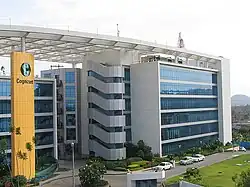





.jpg.webp)


.svg.png.webp)